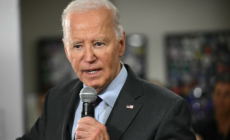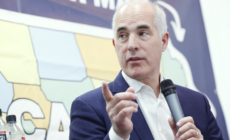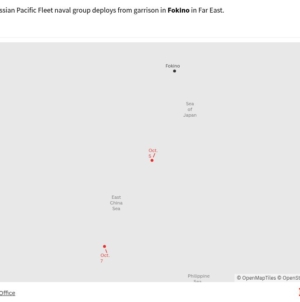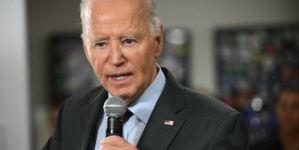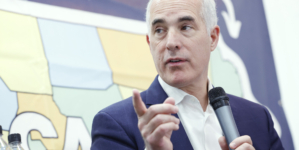-
Map Shows Where Harris, Trump Campaign Donations Came From - 3 mins ago
-
Democrats Walked Into a Trap Republicans Set for Them - 28 mins ago
-
In Kamala Harris’ L.A. neighborhood, low-key quiet and cautious optimism - 29 mins ago
-
Will Joe Biden Pardon Hunter Before Donald Trump Returns to the White House? - 38 mins ago
-
Incoming LAPD chief’s proposed salary cut amid Police Commission drama - about 1 hour ago
-
China Reveals $1.4 Trillion Plan to Bail Out Local Governments - about 1 hour ago
-
Did Bob Casey Concede? Pennsylvania Senator Speaks Out as McCormick Wins - about 1 hour ago
-
Sharon Horgan’s Uncertain Yet Brilliant Path to Apple TV+’s ‘Bad Sisters’ - 2 hours ago
-
The election day freak-out: Some ways that L.A. is coping - 2 hours ago
-
On the Ballot, Abortion Rights Proved More Popular Than Kamala Harris - 2 hours ago
Washington Post Faces Wave of Liberal Fury After Endorsement Decision
Moments after The Washington Post announced on Friday that it would not endorse Vice President Kamala Harris or former President Donald Trump in the presidential race, many Democrats took to social media to criticize the newspaper, which had previously condemned Trump in past presidential campaigns.
Users on X, formerly known as Twitter, called out the decision, with some saying they canceled their subscriptions to the outlet, including actor Jeffrey Wright. In August, the D.C.-native narrated a video for Harris that played at the Democratic National Convention (DNC). Wright posted a screenshot of his canceled subscription, writing, “Washington Post. Hometown paper. Grew up with it. Bye, b*****.”
Democratic strategist and pollster Matt McDermott also shared his subscription cancellation, saying, “easiest decision ever, @washingtonpost.”
In a statement posted on X, the Washington Post Guild noted that within two hours, “We are already seeing cancellations from once loyal readers” over the non-endorsement.
Some pointed to the paper’s slogan, “Democracy Dies in Darkness,” sharing screenshots of its January 7, 2021, headline, “Trump mob storms Capitol,” with the subheadline, “President incites crowd to acts of insurrection, violence.” One user, Reeves, shared the screenshot with the caption, “Four years later, the paper, famous for its tagline ‘Democracy Dies in Darkness,’ doesn’t want to take a stand on who is fit to be president.”
Skyler Johnson, chair of Suffolk Young Democrats, wrote in a post, “At least now we know ‘Democracy Dies in Darkness’ isn’t a motto, it’s their promise.”
Dave Aronberg, state attorney for Palm Beach County, shared a post about the outlet’s decision, writing, “How democracies die, part 287.”
Former deputy national security advisor and speechwriter Ben Rhodes wrote, “There is no logic that isn’t damning as to why the Washington Post and LA Times feel they can endorse in every local, state and federal election other than a presidential race.” In a second post, he added, “It’s not that these endorsements tip the balance in an election; it’s that self-censoring because you are afraid of retribution from an authoritarian tells you everything you need to know about the priorities of management.”
It’s not that these endorsements tip the balance in an election; it’s that self-censoring because you are afraid of retribution from an authoritarian tells you everything you need to know about the priorities of management.
— Ben Rhodes (@brhodes) October 25, 2024
In addition to supporters of Harris and other Democrats, newsroom members also expressed their disappointment in the paper. Editor-at-large Robert Kagen told NPR he resigned from the editorial board over the decision.
Former executive editor of The Post, Martin Baron, slammed the newspaper’s decision on X, formerly Twitter, writing: “This is cowardice, with democracy as its casualty. @realdonaldtrump will see this as an invitation to further intimidate owner @jeffbezos (and others). Disturbing spinelessness at an institution famed for courage.”

Andrew Harnik/Anna Moneymaker/Getty Images
Why didn’t The Washington Post endorse a presidential candidate?
On Friday, publisher and chief executive officer of The Post, William Lewis, wrote: “The Washington Post will not be making an endorsement of a presidential candidate in this election. Nor in any future presidential election.”
The post has a legacy of endorsing candidates, including President Joe Biden in late September 2020 and former Secretary of State Hillary Clinton in 2016. In its 2016 endorsement of Clinton, the editorial board harshly criticized Trump, describing him as “bigoted, ignorant, deceitful, narcissistic, vengeful, petty, misogynistic, fiscally reckless, intellectually lazy, contemptuous of democracy and enamored of America’s enemies. As president, he would pose a grave danger to the nation and the world.”
Lewis’ Friday opinion article announcing the non-endorsement continued, “We are returning to our roots of not endorsing presidential candidates.”
The article concluded, “Our job at The Washington Post is to provide through the newsroom nonpartisan news for all Americans, and thought-provoking, reported views from our opinion team to help our readers make up their own minds,” adding that “Most of all, our job as the newspaper of the capital city of the most important country in the world is to be independent.”
Was The Washington Post going to endorse Kamala Harris?
The Washington Post Guild said in their Friday statement that “according to our own reporters and Guild members, an endorsement of Harris was already drafted.”
Editorial page editor David Shipley reportedly told colleagues before Lewis’ announcement was published. NPR reported that Shipley approved an editorial endorsement for Harris already, which was in the process of being drafted.
How is Jeff Bezos involved?
The Washington Post Guild said that the “decision to not publish” the Harris draft endorsement “was one made by The Post’s owner, Jeff Bezos.” Bezos, the billionaire Amazon and tech giant, bought the paper in 2013.
NPR reported that Shipley told newsroom colleagues that the original drafted endorsement of Harris was under review by Bezos.
Newsweek has reached out to Bezos for comment and clarification via email on Friday evening.
Source link





